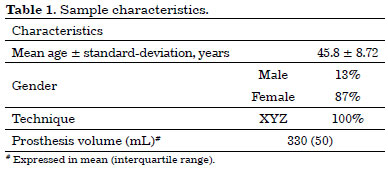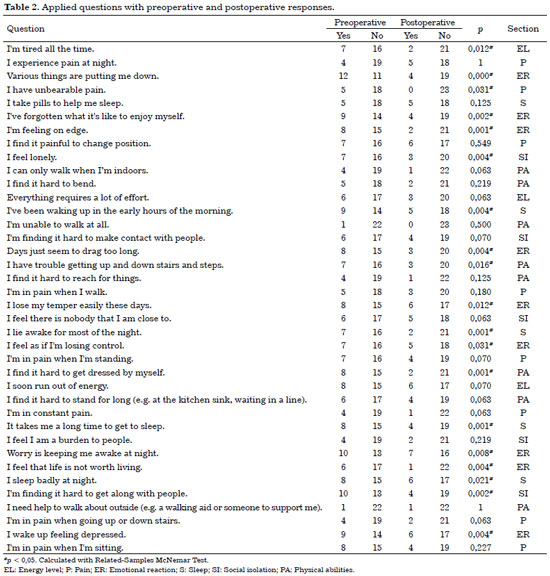

Original Article - Year 2017 - Volume 32 -
Gluteal contour restoration in antiretroviral users and its quality-of-life related impacts: a historical cohort study
Impacto na qualidade de vida em pacientes usuários de medicação retroviral e submetidos à gluteoplastia: estudo de coorte histórica
ABSTRACT
INTRODUCTION: Since the introduction of highly active antiretroviral therapy for the treatment of human immunodeficiency virus (HIV), disease mortality has been dramatically reduced worldwide. One related side effect from the use of these drugs is gluteal lipodystrophy. The aim of this study is to assess the quality-of-life impact of correcting this deformity in HIV patients.
METHODS: A historical cohort study was conducted between January 2010 and December 2014 with 23 patients, assessing the quality of their lives using the Nottingham Health Profile. A statistical analysis was performed using the McNemar test for related samples.
RESULTS: There was a significant difference between preoperative and postoperative response in 19 of the 38 questions.
CONCLUSION: We may say that gluteal reconstruction plays a role in improving quality of life for HIV patients who have been affected by antiretroviral related gluteal lipodystrophy.
Keywords: Buttocks; HIV-associated lipodystrophy syndrome; Quality of life.
RESUMO
INTRODUÇÃO: Desde a introdução do tratamento do HIV com uso da terapia antirretroviral altamente ativa, a mortalidade por essa doença foi reduzida drasticamente em todo o mundo. Um dos parefeitos relacionados à utilização desses fármacos é a lipodistrofia glútea. O objetivo deste trabalho é verificar o impacto da correção dessa deformidade na qualidade de vida de pacientes com HIV.
MÉTODOS: Foi conduzido um estudo de coorte histórica com 23 pacientes submetidos à gluteoplastia com implante intramuscular, entre janeiro de 2010 e dezembro de 2014, avaliando a qualidade de vida por meio do Nottingham Health Profile. As informações foram coletadas de julho a agosto de 2015. A análise estatística foi feita utilizando-se o Related-Samples McNemar Test.
RESULTADOS: Houve diferença significativa entre o pré-operatório e pós-operatório em 19 das 38 perguntas.
CONCLUSÃO: É possível afirmar que a reconstrução glútea melhora a qualidade de vida de pacientes HIV positivos acometidos por lipodistrofia glútea relacionada a antirretrovirais.
Palavras-chave: Nádegas; Síndrome de lipodistrofia associada ao HIV; Qualidade de vida.
Since the introduction of highly active antiretroviral therapy for the treatment of human immunodeficiency virus (HIV), disease mortality has been reduced by about 50 to 80% worldwide1. One related side effect is disturbance of adipose tissue distribution, known as lipodystrophy2. Drugs more commonly associated with these effects are used widely in developing countries, such as Brazil3.
The prevalence of lipodystrophy has varied significantly in different international studies, ranging from 1% to 84%4. There are many risk factors associated with the development of fat distribution disorders, particularly in female patients5. The gender/syndrome relationship is important for plastic surgery because deformity resulting from antiretroviral treatment can become stigmatized, which will have negative impacts on the quality of life of HIV-positive women.
Evaluating quality of life in HIV patients has become crucial for clinical monitoring, as it assesses aspects which are often difficult to measure. Some protocols have been created with the aim of evaluating physical, social, emotional self-care and self-awareness6. Use of these instruments appears to be of fundamental importance for the evaluation of treatment in different areas of health care.
A major stigma caused by antiretroviral related lipodystrophy is the loss of gluteal contour. First performed in 1969 by Bartels7, gluteoplasty seeks to improve buttock contour by inserting prostheses. This technique has been improved over time by exponents, such as Mendieta8 and Gonzalez9, with intramuscular and subfascial variations that optimize results and reduce complications10.
OBJECTIVE
The objective of this study is to assess the role of reconstructive plastic surgery in the treatment of HIV patients by evaluating gluteal reconstruction impacts on those patients' quality of life.
METHODS
A historical cohort study with HIV patients undergoing gluteal reconstruction from January 2010 to December 2014 in Hospital Nossa Senhora da Conceição, Porto Alegre/RS, Brazil, was conducted. According to hospital records, the total population included 32 patients, contacted by phone for personal interviews.
We collected data on the surgical technique, early and late complications, and postoperative evolution related issues. A quality of life survey was also conducted, using the Nottingham Health Profile questionnaire11, an internationally validated tool that consists of 38 yes-no questions categorized into six major areas. For comparison purposes, the test was given using two approaches: (1) to evoke respondent feelings during the preoperative period; (2) to record current respondent feelings.
Answers were compared (preoperative vs postoperative) using the McNemar test for related-samples with IBM SPSS 20® software. Results were considered significant at p<0.05. The project was approved by the Institutional Review Board and is registered in the Plataforma Brasil under CAAE 43504215.6.0000.5530. The research report was guided by the STROBE (Strengthening the Reporting of Observational Studies in Epidemiology) checklist to ensure the methodological quality.
RESULTS
The responses of 23 patients were analyzed. Nine of the 32 patients initially scheduled were not found by the research team through identification data obtained from hospital records. Table 1 shows a sample profile, with the patients' relative clinical features and the surgical technique used. Mean age was 45.8±8.72 years and 87% of the patients were women. The technique used was XYZ9 in all cases, with a prosthesis median volume of 330 mL (interquartile range: 50).

Patients quality of life results are shown in Table 2. A significant difference was found in 19 of the 38 responses, with the following division by section: one in the energy level section, one in the pain section, nine in the emotional reaction section, four in the sleep section, two in the social isolation section, and two in the physical abilities section.
DISCUSSION
These findings support the important role reconstructive gluteoplasty plays for HIV patients with antiretroviral related lipodystrophy12. With nine questions presenting significant difference, the considerable impact on emotional reactions emphasizes the importance of reconstructive plastic surgery to improve the quality of life for these patients.
The authors are currently unaware of any similar research published this far, and this is the first publication to scientifically prove gluteoplasty as a tool to improve quality of life for HIV patients. These data could be a stimulus to include plastic surgeons as members of the multidisciplinary team for the treatment of HIV infection.
The concept of health as complete physical, mental, and social well-being13 reinforces the importance of humanized and comprehensive medical care. The focus on drug-related lipodystrophy patients body contour turns plastic surgery into an active element for the achievement of excellence in health care.
A study limitation here is that these data represent but a portion of the planned population, where only 23 of the 32 patients were included. This is a restricted sample, as this is a relatively uncommon procedure in the Public Health System of Brazil. We cannot say that these represent all HIV patients in the realm of those who undergo gluteal reconstruction; however, it seems illogical to consider that data with such high statistical significance could be a matter of chance.
CONCLUSION
HIV patients with drug-related gluteal lipodystrophy have achieved quality of life improvements with gluteoplasty. The restoration of body contours is effective to improve social integration, emotional balance, and other psychosocial aspects of this population. Therefore, plastic surgeons must become members of these patients' multidisciplinary health care team, intent on providing complete treatment and addressing their health with a global approach.
COLLABORATIONS
GB Analysis and/or interpretation of data; statistical analyses; final approval of the manuscript; conception and design of the study; completion of surgeries and/or experiments; writing the manuscript or critical review of its contents.
FAZ Analysis and/or interpretation of data; completion of surgeries and/or experiments.
KGDR Completion of surgeries and/or experiments. AHPN Analysis and/or interpretation of data; completion of surgeries and/or experiments.
LTC Final approval of the manuscript; writing the manuscript or critical review of its contents.
PAMM Final approval of the manuscript; Completion of surgeries and/or experiments.
REFERENCES
1. Delaney M. History of HAART – the true story of how effective multi-drug therapy was developed for treatment of HIV disease. Retrovirology. 2006;3(Suppl 1):S6.
2. Baril JG, Junod P, Leblanc R, Dion H, Therrien R, Laplante F, et al. HIV-associated lipodystrophy syndrome: A review of clinical aspects. Can J Infect Dis Med Microbiol. 2005;16(4):233-43. DOI: http://dx.doi.org/10.1155/2005/303141
3. Jouquet G, Bygrave H, Kranzer K, Ford N, Gadot L, Lee J, et al. Cost and cost-effectiveness of switching from d4T or AZT to a TDF-based first-line regimen in a resource-limited setting in rural Lesotho. J Acquir Immune Defic Syndr. 2011;58(3):e68-74. PMID: 21765366 DOI: http://dx.doi.org/10.1097/QAI.0b013e31822a9f8d
4. Diehl LA, Dias JR, Paes AC, Thomazini MC, Garcia LR, Cinagawa E, et al. Prevalence of HIV-associated lipodystrophy in Brazilian outpatients: relation with metabolic syndrome and cardiovascular risk factors. Arq Bras Endocrinol Metabol. 2008;52(4):658-67. PMID: 18604379 DOI: http://dx.doi.org/10.1590/S0004-27302008000400012
5. George JA, Venter WD, Van Deventer HE, Crowther NJ. A longitudinal study of the changes in body fat and metabolic parameters in a South African population of HIV-positive patients receiving an antiretroviral therapeutic regimen containing stavudine. AIDS Res Hum Retroviruses. 2009;25(8):771-81. DOI: http://dx.doi.org/10.1089/aid.2008.0308
6. Wu AW. Quality of life assessment comes of age in the era of highly active antiretroviral therapy. AIDS. 2000;14(10):1449-51. DOI: http://dx.doi.org/10.1097/00002030-200007070-00019
7. Bartels RJ, O'Malley JE, Douglas WM, Wilson RG. An unusual use of the Cronin breast prosthesis. Case report. Plast Reconstr Surg. 1969;44(5):500. DOI: http://dx.doi.org/10.1097/00006534-196944050-00023
8. Mendieta CG. Gluteoplasty. Aesthet Surg J. 2003;23(6):441-55. PMID: 19336115 DOI: http://dx.doi.org/10.1016/j.asj.2003.09.008
9. Gonzalez R. Augmentation gluteoplasty: the XYZ method. Aesthetic Plast Surg. 2004;28(6):417-25. DOI: http://dx.doi.org/10.1007/s00266-004-3130-6
10. Serra F, Aboudib JH, Marques RG. Reducing wound complications in gluteal augmentation surgery. Plast Reconstr Surg. 2012;130(5):706e-13e. DOI: http://dx.doi.org/10.1097/PRS.0b013e318267d716
11. Hunt SM, McKenna SP, McEwen J, Backett EM, Williams J, Papp E. A quantitative approach to perceived health status: a validation study. J Epidemiol Community Health. 1980;34(4):281-6. DOI: http://dx.doi.org/10.1136/jech.34.4.281
12. Warde M, Gragnani A, Gomes H, Hochman B, Ferreira LM. The impact of facial lipoatrophy treatment with polymethyl methacrylate in AIDS patients as measured by four quality-of-life Questionnaires. Int J STD AIDS. 2011;22(10):596-9. DOI: http://dx.doi.org/10.1258/ijsa.2009.009086
13. Constitution of the World Health Organization, Basic Documents. 45th ed. Supplement, October 2006 [cited 2017 Jul 25]. Available from: http://www.who.int/governance/eb/who_constitution_en.pdf
1. Hospital Nossa Senhora da Conceição, Porto Alegre, RS, Brazil
2. Universidade Federal do Rio Grande do Sul, Porto Alegre, RS, Brazil
Institution: Hospital Nossa Senhora da Conceição, Porto Alegre, RS, Brazil.
Corresponding author:
Guilherme Barreiro
Av. Francisco Trein, 596 - Cristo Redentor
Porto Alegre, RS, Brazil - Zip Code 91350-200
E-mail: plasticabarreiro@gmail.com
Article received: January 4, 2017.
Article accepted: July 9, 2017.
Conflicts of interest: none.



 Read in Portuguese
Read in Portuguese
 Read in English
Read in English
 PDF PT
PDF PT
 Print
Print
 Send this article by email
Send this article by email
 How to Cite
How to Cite
 Mendeley
Mendeley
 Pocket
Pocket
 Twitter
Twitter